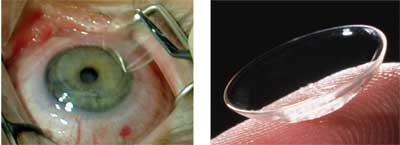A short letter to the editor, tucked unobtrusively in the very back of the October issue of Archives of Ophthalmology, has stirred a hornets nest of controversy. In the letter, three accomplished ophthalmologists suggest that refractive surgery is as safe as contact lens wearmaybe safer.
The public and ophthalmologists have assumed that refractive surgery, while attractive, constitutes the higher risk. This may not be correct, the authors of the letter say.
Surprisingly, the three ophthalmologists have a substantial background in contact lenses. They are: William Mathers, a corneal specialist and refractive surgeon at Oregon Health & Science Universitys Casey Eye Institute, Portland, Ore., and a past president of the Contact Lens Association of Ophthalmologists; Frederick W. Fraunfelder, also a corneal specialist at Casey Eye Institute and co-author of Drug-Induced Ocular Side Effects (Butterworth-Heinemann, 2001); and Larry Rich, the director of Casey Eye Institutes Cornea and Refractive Services, who spent his teen years as a contact lens technician in his fathers optometric practice.
 | |
| The risk of vision loss is 1 in 2,000 in contact lens wearers, say corneal specialists at Casey Eye Institute. The risk from refractive surgery is 1 in 10,000, they estimate. |
In the letter, Dr. Mathers and his co-authors acknowledge that the risks of refractive surgery and those of contact lenses cannot be compared directly. So, they extrapolated from previously published studies to determine that the lifetime risk of vision loss (visual acuity of 20/70 or worse) among contact lens wearers is one in 2,000. They also looked at data from a study of refractive surgery outcomes in members of the U.S. Army and data from the Casey Eye Institute to determine that the incidence of vision loss (more than two lines) among refractive surgery patients is one in 10,000.
Its not that contacts arent good. Theyre better than theyve ever been. But one cannot assume contacts are safer, Dr. Mathers says in a separate statement. Even with perfect care of your contacts, the risks for infection and vision loss are still there. Our long-term results confirm the experience of the U.S. military: Laser surgery is as safe, and probably safer, than long-term use of contact lenses.
Not surprisingly, these comments were not well received among the optometric community.
The reality is that contact lenses remain among the safest forms of correction, wrote Arthur B. Epstein, O.D, in the October 14 issue of the e-newsletter Optometric Physician. While Dr. Mathers undoubtedly has seen patients lose eyes, many of us in the contact lens community have spent untold hours trying to help patients who have had their lives literally destroyed by LASIK.
For example, Dr. Epstein noted, the most recent survey from the American Society of Cataract and Refractive Surgerys Cornea Clinical Committee determined that the number of cases of infectious keratitis after refractive surgery rose slightly in 2004one case for every 2,131 procedures.
Despite this, both LASIK and contact lenses are safe, but the statements in this letter are misleading, says optometrist Glenda Secor, chair of the Cornea and Contact Lens Section of the American Academy of Optometry. In particular, there are issues with LASIK other than just vision loss. There are adverse effects with glare, haloes and dryness. Its misleading the way [Dr. Mathers] has compared the two.
Contact lens clinicians know by experience that contact lenses are generally safer than refractive surgery, Dr. Secor says. But what we found, because we really searched, is that we dont really have studies that back this up.
While contact lenses and LASIK are not truly comparable, there are no studies that compare corneal inflammation directly to vision loss, Dr. Secor says. What this letter has done is point out the fact that we need case-controlled studies that provide scientific data on what we already know anecdotally.
Dr. Mathers and his co-authors concluded their letter on a similar note: Data from large, peer-reviewed studies strongly suggest that our intuition regarding these risks needs to be reassessed. We look forward to further investigation of these risks.
Mathers WD, Fraunfelder FW, Rich LF. Risk of LASIK surgery vs contact lenses. Arch Ophthalmol 2006 Oct; 124(10):1510-1.

